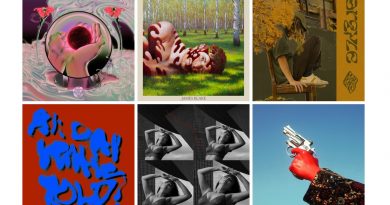Craig Almquist: The Path of an Artist
WRITTEN BY: SAMI RAHMAN
It doesn’t sound like a musician’s dream scenario. The year is 2012. He’s playing yet another of many hot, sweaty shows on the streets in Austin, Texas, hoping that he doesn’t have to sleep in the van again. There’s a decent crowd watching, but nothing to write home about. An old man steps out of the crowd after one of the songs, looking like someone’s grandfather. He asks a few questions, he hands him a CD, and then he’s gone. He thinks nothing of it.
Two weeks later, Craig Almquist, front man of Cold Fronts, has forgotten all about the encounter. He gets a call from his manager asking him if he gave a CD to Seymour Stein. A quick Google search confirms that Seymour Stein, the founder of Sire Records who signed The Ramones, The Talking Heads, and Madonna, was the old man who approached him. Fast-forward four years. Cold Fronts have just released their debut album, Forever Whatever, on Sire Records.

Almquist, 26, sits in his Fishtown apartment as the sun begins to dip below the horizon. His long brown hair flows freely, released from the confines of the Baltimore Orioles snapback that’s usually perched on top of it. The days of being scouted by major labels have faded, and Almquist has settled into a living that may not be what he pictured, going on tour between delivering pizza and working as a bouncer.
The muted sounds of the city drift in through the window as he glances down at his computer, a look of concern sliding across his face. “Oh no,” he mumbles apprehensively, turning to the laptop. “One of my friends may have just broken her arm.” Despite his perfectly understandable need to reach out to his friend, he assures me that he is not ignoring me−-this will just take a second.
Perhaps it was his upbringing in sleepy York, PA, but Craig exudes a small-town sense of empathy and candor that is hard to find in a big city. His bed is made, his college diploma hangs framed on his bedroom wall, and if you entered, you might think you were in a 35-year-old professional’s bedroom. But the telltale signs of young adulthood still peek through; a half-smoked bowl sits on a table, and his favorite records are displayed proudly on a shelf above his television. Wilco, Weezer, The Strokes: the collection appears to be there to admire and worship, wrapped in plastic, never to be played.
Craig’s older brother Mike Almquist, 32, recalls a moment six years ago when Craig seemed to be worried about the direction the band was going in. Cold Fronts had just played a show at Kung Fu Necktie. The crowd was a decent size, but nothing special. After the show, Craig sat outside with his brother.
“He was telling me about how he thought that the show went badly, and no one showed up,” Mike said. He pauses, then continues, “I said the show was great, but Craig started to cry. I could see the water in his eyes, I could hear it in his voice.”
Craig Carl Almquist was born in Baltimore. His parents, David and Philista Almquist, were born-again Christians, and they tried to instill those values into Craig and Mike.
“It’s not like there was a ‘No Dancing’ rule,” Mike said. “There was nothing but love from our parents.”
Craig’s uncle was a pastor at the church they attended as kids. Church was the first place Craig was exposed to music. Growing up, he loved listening to the worship band that would play, and eventually he started playing drums in the band.
Always an outgoing, happy child, Craig discovered a desire for performing and being the center of attention.
“Craig did the Bee Gees ‘Stayin’ Alive’ in a school talent show, and it went over like gangbusters,” Mike recalls. On a family vacation to Jamaica when Craig was eight years old, however, a performance of the same song nearly went awry.
At a hotel talent show, Craig took the stage expecting the band to know how to play the Bee Gees hit. The band didn’t know the song, and Craig spent a few minutes on the stage trying to get them to play it in front of over 100 people. Eventually they gave him a disco beat, and he sang a 15-second version of the song to rapturous applause.
Craig took a break from music in middle school to perform magic. He was paid to put on magic shows, but soon returned to music in high school, taking on the drums. However, this role didn’t last long.
“He discovered he didn’t like being in the back of the band,” Craig’s father David joked. “So he started playing guitar.”
Knowing that he wanted to go to Philadelphia for college, Craig was unsure about what course of study he wanted to pursue. This led his to choose the communications program at La Salle University halfheartedly.
One night Craig was watching “Late Night with Jimmy Fallon” when an advertisement appeared saying that the show was hiring college interns. He met up with some friends to help create his video résumé, the key component to the application. To his delight, Craig landed an internship in the show’s writing department.
Craig’s summer in New York completely changed his career path.
“Watching all the writers doing stand-up comedy, and working with all these creative people, it made me realize that I didn’t want to have a job where I needed a resume,” Craig said.
He tried his hand at stand-up, but soon realized that it would take a long time even to be decent. One thing he was confident in, however, was his songwriting ability.
He returned from New York inspired, and started Cold Fronts with some friends, including “Shakey” Jake on guitar, Jake’s brother Dylan on bass, and Al Smith on drums. After playing a few shows, two different people contacted Craig saying that they wanted to manage the band. With all pieces in place, Cold Fronts embarked on its first tour.
During one tour, tension between Craig and Jake began to escalate. Craig wrote the songs and played guitar in Cold Fronts. Jake was also wrote songs, some of which he wanted Craig to sing at shows. Craig sang them, but he felt a little uncomfortable singing someone else’s songs.
The tension came to a head one night on tour. Everyone had a little too much to drink, and in the middle of the show, Jake asked to play one of his songs. There was an argument onstage, and Craig ended up kicking a hole in the bass drum. After the show, Jake and his brother decided to leave the band.
Talks with Sire Records had started to heat up at this point, but they had yet to sign a contract. Since Craig and drummer Al were the only remaining parts of the band, Craig called some friends to play with them. There was some deliberation before they signing with Sire, however. Craig worried that due to the band’s lack of popularity, they might get lost in the shuffle. On the other hand, he was aware that Sire would support them financially.
After weighing the pros and cons, Craig decided to sign with Sire. “Bands I really like were The Strokes, Weezer, The Killers. Big bands that started on big labels,” Craig explained.
Freshly signed, the band set about recording its debut album. Comprised of Craig’s best songwriting work thus far, the album is polished, tight and catchy.
“You want to make something timeless,” Craig said.
After Forever Whatever, was recorded, it sat unreleased for almost two years. The label was moving much too slow for Craig, causing him to lose patience. After one tour, Craig scheduled an interview with Seymour Stein. Dirty, unshaven and exhausted, he drove eight hours to attend the meeting. He stormed in and told them pointedly, “Release my album, or drop me.”
Sire listened, but because Craig had given them an ultimatum, the album release was slightly rushed, coming out in October 2015, without the promotion that typically accompanies a release. Overall, the experience gave Craig some insight into what it was like to be in the music industry.
“I don’t regret it, but I know what I would do differently now,” Craig said.
Craig’s commitment to the band paid off though, and now Cold Fronts is playing another show at Kung Fu Necktie. Performing for a packed house, the band delivers its melodic guitar racket confidently. Halfway through the set, a girl leans over to me. “Craig gets crazy eyes when he plays,” she says. “Isn’t it great?” The crowd eats it up, while Craig beams between songs, looking perfectly content and natural on the small stage.
“Just because you can’t make a million dollars off of it, I’m still going to keep going,” Craig says wistfully, back in his bedroom.
Forgetting about the label stress, the bad shows, and the band infighting, his eyes go somewhere distant. He drifts back to Earth and looks at me.
“I don’t think I would ever do anything other than music.”




